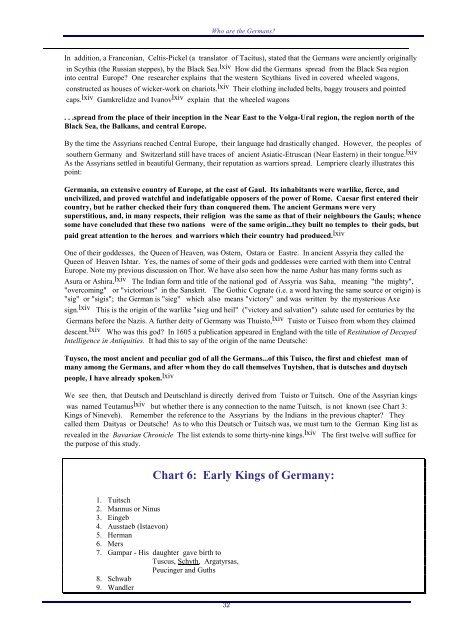WHO ARE THE GERMANS - Churches of God Cyber Auxiliary
WHO ARE THE GERMANS - Churches of God Cyber Auxiliary
WHO ARE THE GERMANS - Churches of God Cyber Auxiliary
You also want an ePaper? Increase the reach of your titles
YUMPU automatically turns print PDFs into web optimized ePapers that Google loves.
Who are the Germans?<br />
In addition, a Franconian, Celtis-Pickel (a translator <strong>of</strong> Tacitus), stated that the Germans were anciently originally<br />
in Scythia (the Russian steppes), by the Black Sea. lxiv How did the Germans spread from the Black Sea region<br />
into central Europe? One researcher explains that the western Scythians lived in covered wheeled wagons,<br />
constructed as houses <strong>of</strong> wicker-work on chariots. lxiv Their clothing included belts, baggy trousers and pointed<br />
caps. lxiv Gamkrelidze and Ivanovlxiv explain that the wheeled wagons<br />
. . .spread from the place <strong>of</strong> their inception in the Near East to the Volga-Ural region, the region north <strong>of</strong> the<br />
Black Sea, the Balkans, and central Europe.<br />
By the time the Assyrians reached Central Europe, their language had drastically changed. However, the peoples <strong>of</strong><br />
southern Germany and Switzerland still have traces <strong>of</strong> ancient Asiatic-Etruscan (Near Eastern) in their tongue. lxiv<br />
As the Assyrians settled in beautiful Germany, their reputation as warriors spread. Lempriere clearly illustrates this<br />
point:<br />
Germania, an extensive country <strong>of</strong> Europe, at the east <strong>of</strong> Gaul. Its inhabitants were warlike, fierce, and<br />
uncivilized, and proved watchful and indefatigable opposers <strong>of</strong> the power <strong>of</strong> Rome. Caesar first entered their<br />
country, but he rather checked their fury than conquered them. The ancient Germans were very<br />
superstitious, and, in many respects, their religion was the same as that <strong>of</strong> their neighbours the Gauls; whence<br />
some have concluded that these two nations were <strong>of</strong> the same origin...they built no temples to their gods, but<br />
paid great attention to the heroes and warriors which their country had produced. lxiv<br />
One <strong>of</strong> their goddesses, the Queen <strong>of</strong> Heaven, was Ostern, Ostara or Eastre. In ancient Assyria they called the<br />
Queen <strong>of</strong> Heaven Ishtar. Yes, the names <strong>of</strong> some <strong>of</strong> their gods and goddesses were carried with them into Central<br />
Europe. Note my previous discussion on Thor. We have also seen how the name Ashur has many forms such as<br />
Asura or Ashira. lxiv The Indian form and title <strong>of</strong> the national god <strong>of</strong> Assyria was Saha, meaning "the mighty",<br />
"overcoming" or "victorious" in the Sanskrit. The Gothic Cognate (i.e. a word having the same source or origin) is<br />
"sig" or "sigis"; the German is "sieg" which also means "victory" and was written by the mysterious Axe<br />
sign. lxiv This is the origin <strong>of</strong> the warlike "sieg und heil" ("victory and salvation") salute used for centuries by the<br />
Germans before the Nazis. A further deity <strong>of</strong> Germany was Thuisto, lxiv Tuisto or Tuisco from whom they claimed<br />
descent. lxiv Who was this god? In 1605 a publication appeared in England with the title <strong>of</strong> Restitution <strong>of</strong> Decayed<br />
Intelligence in Antiquities. It had this to say <strong>of</strong> the origin <strong>of</strong> the name Deutsche:<br />
Tuysco, the most ancient and peculiar god <strong>of</strong> all the Germans...<strong>of</strong> this Tuisco, the first and chiefest man <strong>of</strong><br />
many among the Germans, and after whom they do call themselves Tuytshen, that is dutsches and duytsch<br />
people, I have already spoken. lxiv<br />
We see then, that Deutsch and Deutschland is directly derived from Tuisto or Tuitsch. One <strong>of</strong> the Assyrian kings<br />
was named Teutamuslxiv but whether there is any connection to the name Tuitsch, is not known (see Chart 3:<br />
Kings <strong>of</strong> Nineveh). Remember the reference to the Assyrians by the Indians in the previous chapter? They<br />
called them Daityas or Deutsche! As to who this Deutsch or Tuitsch was, we must turn to the German King list as<br />
revealed in the Bavarian Chronicle The list extends to some thirty-nine kings. lxiv The first twelve will suffice for<br />
the purpose <strong>of</strong> this study.<br />
Chart 6: Early Kings <strong>of</strong> Germany:<br />
1. Tuitsch<br />
2. Mannus or Ninus<br />
3. Eingeb<br />
4. Ausstaeb (Istaevon)<br />
5. Herman<br />
6. Mers<br />
7. Gampar - His daughter gave birth to<br />
Tuscus, Schyth, Argatyrsas,<br />
Peucinger and Guths<br />
8. Schwab<br />
9. Wandler<br />
32


